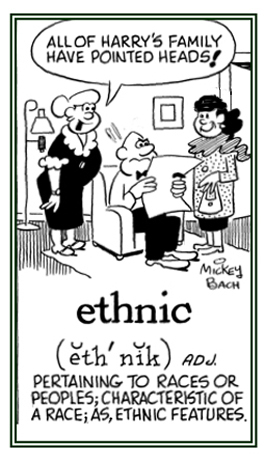ethno-, ethn- +
(Greek: people, race, tribe, nation; group of people living together; community, family)
2. Designating the physical and cultural traits that distinguish those of one society or larger human group from members of other such people: Joan played the violin in an orchestra with many people from different ethnic backgrounds from around the world.
3. Etymology: from Latin ethnic(us), "pagan", from Greek ethnikos, "peculiar to a nation", from Greek ethn(os), "a nation, a people".

Go to this Word A Day Revisited Index
so you can see more of Mickey Bach's cartoons.
An ethnic group is a human population whose members identify with each other, usually on the basis of a presumed common genealogy or ancestry. Ethnic groups are also usually united by common cultural, behavioral, linguistic, or religious practices.
2. Ethnic traits in general.
2. The use of archaeological/archeological techniques and data to study living cultures, especially current or recent aboriginal groups, such as the Inuit or Bushmen.
Ethnoarchaeology is the study of contemporary cultures with a view to understanding the behavioral relationships which underlie the production of material culture. It uses archaeological techniques and data to study these living cultures and uses ethnographic data to inform the examination of the archaeological record.
Ethnoarchaeology is a relatively new branch of the discipline, followed particularly in America. It seeks to compare the patterns recognized in the material culture from archaeological contexts with patterns yielded through the study of living societies.
The ethnoarchaeologist is particularly concerned with the manufacture, distribution, and use of artifacts, the remains of various processes that might be expected to survive, and the interpretation of archaeological material in the light of the ethnographic information.
Less materially oriented questions. such as technological development, subsistence strategies, and social evolution are also compared in archaeology and ethnolo, under the general heading of ethnographic analogy.
2. The study of ethnic groups as they are affected by the biological factors in their environment.
3. The study of the way various cultural groups make use of or interact with the animals and plants of their environment.
![]() An ethnobiologist who is working to preserve the skills of native medicine men (shamans) in South America.
An ethnobiologist who is working to preserve the skills of native medicine men (shamans) in South America.

